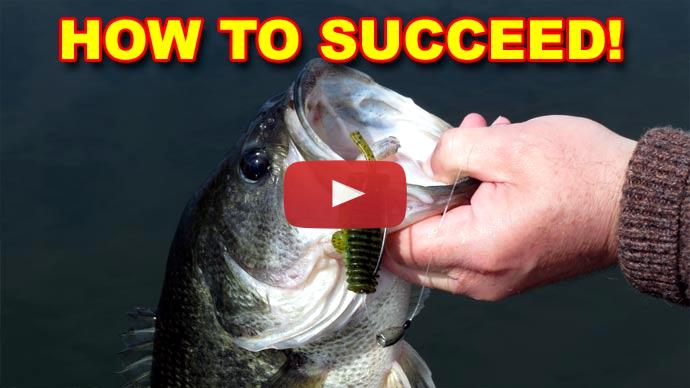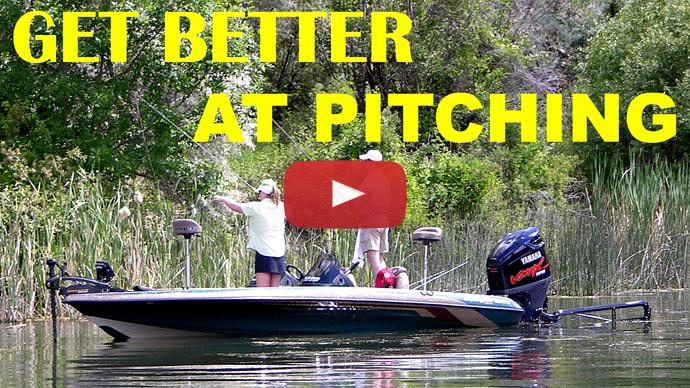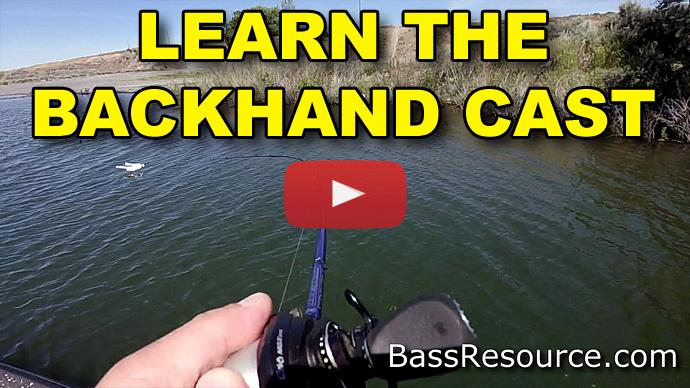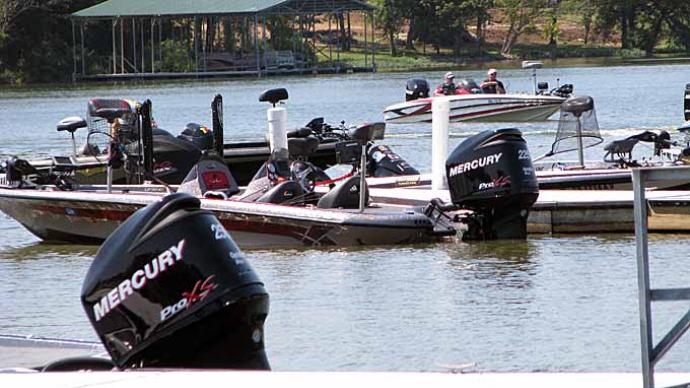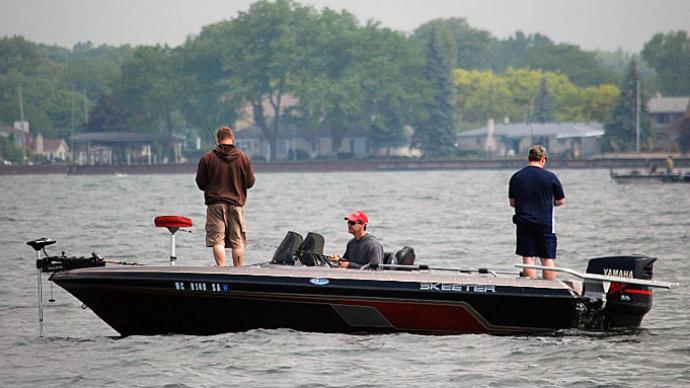Keri: There we go.
Glenn: Might be too dark to get this guy on camera. Got to be bright, clear water.
Keri: Followed it to the boat, caught it with a Senko. Little buck bass again. They're all footballs. They're footballs. Okay, thank you for playing. I appreciate it, you were textbook.
Glenn: Hey, folks. Glenn May here with BassResource.com, and today, I wanna talk about being a backseater. What you guys might not know is you see me all the time in my boat, what you don't know is I fished tournaments for 12 years as a backseater. I was a starving college kid, I didn't even have a truck to pull a boat, so I had to get a truck, I had to buy a boat. It took me years to save up to do it. So I backseated for 12 years. So, I wanna pass along some tips that I learned along the way to help you be more successful from the back seat. And also, you wanna be that guy that everybody wants to fish with, you don't wanna be that backseater that they talk about and say, "Yeah. Don't take him." So, let me go through some of these tips.
The first thing before you go on a tournament with somebody, communication is absolutely key. Talk before the tournament. You wanna find out, is this guy a...is he a power fisherman, does he fish fast or is he more of a finesse fisherman? Does he like to fish deep or shallow, primarily? What type of tactics does he like to use? That's gonna help you formulate your game plan a bit and know what to expect. But you also wanna talk through things that happen on the water, for example, netting the fish. It sounds basic. Everybody just grabs a fish. Actually, there's different ways to net the fish and people have their preferences.
For example, I like to have my non-boater put the net down and I'll bring the fish to him and then they can scoop it up as I bring it to him. Some other people like to have the fish out there and have the boater reach in and grab them. Have that quick conversation because you don't want to have a miscue when fish are on the line. The other piece is when you are bringing in the fish, hey talk. Talk, talk, talk. "Hey, I'm bringing the fish to you right now, get that net down. I'm bringing them to you. Scoop them up." Not so much order, but just let them know what you're doing and what you expect.
Communication is absolutely key. When are you going to meet in the morning prior to blast off? Who's going to the driver's meeting? Who's launching the boat? Who Isn't? Just work through those logistics.
The second tip I can give you is preparation. Do your homework, do your map study. Understand what's the clarity of the lake, what kind of water temperature do you expect this time of year? What's the seasonal pattern you might think you might have? Is it smallmouth, largemouth? What are some of the past tournaments? What kind of patterns and lures were they won on? Just learn a lot because that's gonna help you when you get on the water, help you formulate how you're gonna catch more fish. And again, communicate with your angler.
Understand what the boater likes to do. If he's a power fisherman, then figure out what strategies will work best with that.
Because that brings me to my third tip and that is what are you going to bring with you on the boat? We've had those two conversations...actually, the conversations and you've done your preparation, now you've got an idea of what kind of lures and equipment that you need. Bass boats, as modern as they are, still don't have a whole lot of room for the backseater. You've got room for maybe five rods and a good size tackle box, maybe a soft-sided tackle box. So, you got to be strategic about what you're gonna bring.
So, for example, if it's mostly a clear lake and it's deepwater fishing, then you're probably gonna bring mostly spinning gear or light gear. So, with that, I would probably bring three spinning outfits. One would be a split shot, the other would be a drop shot, and the other one would be something with an open hook jig for like a tube jig or something like that. And then I'd have a crankbait rod with me and then I'd probably have your all-around, all-purpose baitcasting rod, which is a 7-foot, medium-heavy power, fast action rod that you can throw an abundance of things on and be it from spinnerbaits to worms to anything else. So, that's what I would do if it was that situation.
But say, for example, the water is maybe 2 feet or less visibility, it's primarily shallow, there's lots of tullies and flooded bushes that you're gonna be fishing and your boater really likes to flip and pitch all day long, well, you can stow those spinning rods at home. Maybe you bring one just in case, but the rest of it, I would load up, I would have a flipping stick with me. Still, maybe have a crankbait rod, maybe not. And then the other three rods, or the other two rods, two or three rods if you don't bring the crankbait, it would be those medium-heavy power fast action rods. One would have a crankbait and one would have a worm on it, another one would have a jig on it, another one might have a topwater or a frog or something on it, that sort of thing.
Just think through. You can cut off lures and retie. Just think about some of the rods and reels you bring that you can have versatility. That's what it's all about. Same thing within your tackle box.
If you know you're gonna be throwing plastic worms all day, you don't need to bring all your plastic worms and all the colors. Grab your Plano tackle box. Plano has 3700 tackle boxes. Take them out and only put three or four of the same kind of type of worms in there with maybe two or three different colors. Same thing with tubes. You've got a plastics box now, not just worm box, but you've got your tubes, you got grubs, hula grubs, whatever, all in one box. Crankbaits, you only need maybe 5 to 10 crankbaits, a shallow diving, a medium diver, and a deep diver, and you have those in a couple of different colors and actions, so maybe 5 or 5 or 10 crankbaits at the most. You don't need to bring all your crankbaits, that sort of thing. Just downsize it. Once you've done all that work beforehand, you'll get a good idea of what you need. Just bring what you need for that day.
Keri: That's a bigger fish. He's over here.
Glenn: There you go. There you go. That’s a good fish.
Keri: I think I got him pretty good. Yeah, nice fish. Better than the ones I've caught all day. He wants to just swim to the camera. Oh, my reel came undone. Come here, dude. Come here. That was just a happenstance cast. Yeah, you weren't going nowhere. And I had you weirdly hooked, but I had you hooked.
Glenn: The fourth tip I wanna give you is about courtesy and respect. You're a guest on someone's boat, but treat it like it's your own. So, for example, if you're bringing some food to eat during the day, everybody does, bring something that doesn't make a mess. I have a friend of mine who his backseater ended up, at the end of the day, there was all these peanut shells all over his back deck. Don't be that guy. Don't bring potato chips, that sort of stuff that makes a mess. I like to bring beef jerky. Beef jerky is mess-free. I bring little power bars, that sort of thing. They don't make a lot of mess. That sort of stuff.
And also, when you're done at the end of the day, just clean up after yourself. You got any line clippings or any discarded plastics, anything like that, just pick them up. Make sure that you haven't left any garbage behind.
And also, when you're moving around the boat, please don't step on the seats. There should be a step. Most bass boats have a step for you to get in the back boat, use that, don't step on the seats unless you absolutely have to. There's no options. It goes with when you get in the boat. If you are to a gravel launch or dirt launch, this is what I do. I own my own boat and I'll push it out and I'll take my feet over the side and I'll dip the soles in the water just to get the dirt and the gravel and everything off my feet before I track any dirt or mud or anything on my boat.
So, just do the same thing. Just take care of it like, it's your own, and that will go a long way. Boaters recognize that. They see you're taking the effort to take care of your boat or their boat and they recognize that. You're gonna be invited back. There we go.
Keri: Deadstick, deadstick, yank. That's a goby. That would be a goby. Smile for the camera. And he just pounced on it. Once I moved it, it was like. You aren't going... That was a goby. I caught a fish with a goby. Here you go. Thank you for the goby fish and thank you for playing. Swim under the boat.
Glenn: The last one, tip number five. And that's, try to help out as much as you can and it's a variety of different things. For example, when you're at the ramp, taking the tie-downs off, taking the cover off the boat, just setting up the seats, helping them get the boat prepped already to go. Ask the boater, "What can I do to help? What would you like me to do?" Bringing in tackle, whatever it needs to be done.
Backing the boat down the ramp to launch it and also backing the trailer down to get the boat back, this is actually great invaluable experience for you. Learn how to do that. Learn, learn, learn how to back a trailer down a ramp because when you start to fish with a whole bunch of different people, what ends up happening, they got all kinds of different trucks and rigs from vans to cars to SUVs, all different wheelbases and different sizes of boats from 16-foot on up to 22-foot, twin axle, single axle, they all react differently backing down a ramp.
Well, it was great for me because I got to try and learn all of these different ways, different rigs to back a boat. And now I can back anything to, into anything. Seriously. I can put a good size boat into a little teeny spot with very little maneuverability. I'm really good at it. And that's because I had all that experience backing down everybody else's boat and truck. So, volunteer to do that, learn how to do it. Most guys will walk you through it.
And also, when you're putting the boat away when you're done fishing, again, putting the cover back on, putting the tie straps down. Just ask what you can do to help.
And then, finally, there's the issue of sharing costs. It's a custom, it's not mandatory, boaters shouldn't expect it. You shouldn't feel obligated to do it, but it is a custom to... If you've been running all over the lake, all over hill and dale, that's a lot of gas to burn up. So, if it makes sense, "Hey, bud. Can I help pay for half the gas? How much gas do you think we burned?" And he'll offer to pay for half of that. Not a big deal. If you burn a lot of oil, that kind of stuff, just figure out what half that cost would be and offer to pay for it.
A lot of boaters won't accept it. If I was gonna go out fishing that day anyway and I was taking somebody out, I was gonna burn that gas anyway and I'll just, "Hey, thanks. I appreciate the offer but it's on me. Don't worry about it." Sometimes they will, just depends on the boater.
But the boater shouldn't expect you to also pay for part of the insurance and what the maintenance costs are and all that stuff. It's like that guy bought a boat and he accepted the responsibility of the costs of maintenance that go with it. That shouldn't be part of your obligation.
This goes upfront to the very beginning to tip number one, which is communication. You might wanna talk about that upfront what's expected at the end of the day, what your share might be if you wanna offer that.
Those are the five main tips for fishing as a backseater that's gonna help you be much more successful as a tournament angler. For more tips like this, visit BassResource.com.

